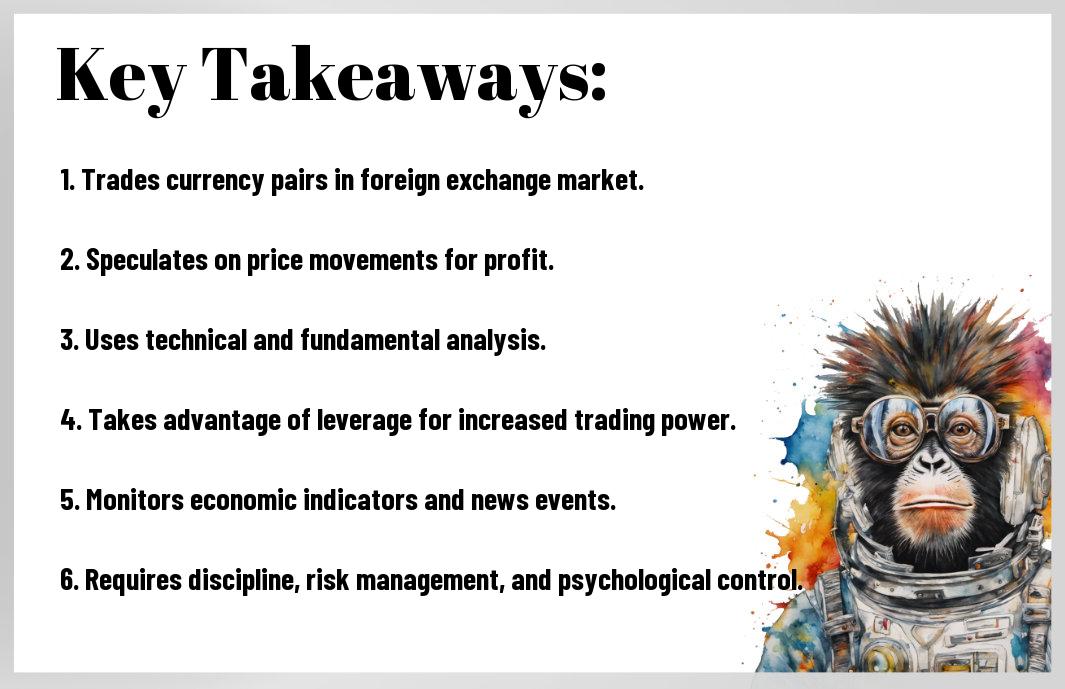It is crucial to understand the world of forex trading, where individuals engage in the buying and selling of foreign currencies in the global marketplace. Forex traders aim to profit from fluctuations in exchange rates by speculating on which way a currency pair will move. This high-risk, high-reward market offers significant opportunities for those who can master the art of trading currencies. However, it also carries the potential for substantial losses if not approached with caution and a strong strategy. By staying informed, utilizing analytical tools, and managing risk effectively, forex traders can navigate this dynamic and volatile market successfully.
Key Takeaways:
- A Forex trader is an individual or entity that participates in the foreign exchange market by buying and selling currency pairs.
- Forex traders often use fundamental and technical analysis to make trading decisions based on economic indicators, market trends, and price movement patterns.
- Risk management is a crucial aspect of forex trading, as traders aim to minimize potential losses and protect their capital through strategies such as setting stop-loss orders and proper position sizing.

Understanding the Forex Market
History of Forex Trading
Market trading has evolved over centuries, with the Forex market being a prominent player in the modern financial landscape. The Forex market, short for foreign exchange, dates back to the ancient times when goods were exchanged for other goods. However, it wasn’t until the 1970s that the Forex market as we know it today came into existence with the adoption of the floating exchange rate system.
Major Currency Pairs and Market Hours
Major currency pairs are the most heavily traded pairs in the Forex market, including EUR/USD, USD/JPY, and GBP/USD. These pairs are characterized by high liquidity and are popular among traders for their tight spreads and volatility. The Forex market operates 24 hours a day, five days a week, starting from the opening in Australia on Monday morning to the close of trading in New York on Friday evening.
It is crucial for traders to be aware of the market hours of different currency pairs to maximize trading opportunities. Different currency pairs have varying levels of volatility and activity at different times of the day, which traders can capitalize on for potential profit.
Types of Forex Traders
To understand the world of Forex trading better, it is important to look at the different types of traders involved in the financial markets. There are two main types of Forex traders – Retail Forex Traders and Institutional Forex Traders. Each group plays a significant role in the Forex market, with varying strategies, goals, and levels of expertise.
| Retail Forex Traders | Institutional Forex Traders |
| Individual traders who trade with their own investment capital | Professional traders who trade on behalf of financial institutions |
| Have smaller capital compared to institutional traders | Trade with larger capital and access to advanced trading tools |
| More susceptible to market volatility and emotional trading | Follow strict risk management protocols and trading strategies |
| May lack resources for in-depth market analysis | Have extensive resources for market research and analysis |
| Seek to generate income or wealth through trading | Focus on maximizing profits for their institutions |
Retail Forex Traders
Any individual with an internet connection and some capital can become a retail Forex trader. These traders often operate on a smaller scale, using their own funds to speculate on currency price movements. Retail traders typically rely on online trading platforms provided by brokers to access the Forex market.
Institutional Forex Traders
One of the significant differences between retail and institutional traders is the scale of operation. Institutional traders represent financial institutions such as banks, hedge funds, and large corporations. They trade with significantly larger amounts of capital and often have access to exclusive market research and analysis tools. Institutional traders follow strict risk management guidelines and have well-defined trading strategies to maintain profitability.
A crucial point to note is that institutional traders sometimes engage in high-frequency trading (HFT), a strategy that utilizes powerful computers to execute trades at lightning speed. This practice can pose risks in the form of market manipulation and increased volatility.
Assume that both types of traders play vital roles in the global Forex market, contributing to liquidity and price discovery.
Strategies and Tools for Forex Trading
Despite the complexities of the forex market, it offers a plethora of opportunities for traders of all levels. Understanding the strategies and tools available is imperative for success in the forex market. For more information on who trades currencies and why, check out this Forex Market: Who Trades Currencies and Why article.
Fundamental Analysis
On a fundamental level, traders use economic indicators, geopolitical events, and news releases to evaluate the intrinsic value of a currency. By understanding the underlying factors affecting a country’s economy, traders can make informed decisions on their trades, anticipating market movements based on these fundamental factors.
Technical Analysis and Charting Tools
To effectively analyze price movements, traders utilize various technical analysis tools and charting techniques. These tools include trend lines, support and resistance levels, moving averages, and oscillators. These tools help traders identify patterns and trends in the market, enabling them to predict potential price movements and make informed trading decisions.
The use of technical analysis and charting tools is crucial in forex trading as it provides traders with valuable insights into market behavior. It allows traders to identify entry and exit points based on historical price data, making it an imperative part of a trader’s strategy.
Risks and Challenges in Forex Trading
Leverage and its Risks
Many new traders are attracted to the forex market because of the potential for high returns through leverage. Leverage allows traders to control positions that are much larger than their initial investment, amplifying profits. However, this also means that losses can also be significantly magnified. It is crucial for traders to understand the risks involved with leverage and to use it wisely to avoid large losses that could wipe out their trading accounts.
Emotional Discipline and Risk Management
Many traders underestimate the importance of emotional discipline and risk management in forex trading. Emotions such as fear and greed can cloud judgment and lead to impulsive decision-making, which can result in substantial losses. Effective risk management involves setting stop-loss orders, diversifying investments, and sticking to a trading plan. Traders who are disciplined and manage their risks effectively are more likely to succeed in the forex market over the long term.
Avoiding emotional decisions and implementing sound risk management strategies can help traders navigate the challenges of the forex market and increase their chances of success.
Becoming a Successful Forex Trader
Education and Continuous Learning
After deciding to become a forex trader, the first step towards success is education and continuous learning. An understanding of the forex market, various trading strategies, technical and fundamental analysis, risk management, and trading psychology is crucial. Continuous learning through webinars, courses, books, and staying updated on market news is important to keep improving your trading skills.
Practice and Experience
After gaining knowledge, the next step is putting it into practice through actual trading. Continuous practice and experience are key to honing your skills and developing your trading style. Start with a demo account to practice without risking real money, then gradually move on to live trading once you are confident in your abilities.
Becoming a successful forex trader requires dedication, discipline, and the ability to adapt to changing market conditions. It is important to stay patient and not be disheartened by initial losses, as they are part of the learning process. Keeping emotions in check, following a trading plan, and constantly evaluating and improving your strategies are crucial aspects of achieving success in forex trading.
Summing up
Drawing together the various aspects discussed, a forex trader is an individual who engages in the buying and selling of currencies on the foreign exchange market. They analyze market trends, use various tools and indicators, and make informed decisions to profit from the fluctuations in currency prices. Forex traders have the ability to trade from anywhere in the world, at any time, and can potentially earn a living from their trading activities. It requires a combination of skill, knowledge, discipline, and risk management to be successful in the forex market. Understanding the intricacies of the market and continuously adapting to changes are necessary qualities of a successful forex trader.
FAQ
Q: What is a forex trader?
A: A forex trader is an individual or entity that engages in the buying and selling of currencies on the foreign exchange market. These traders make profits by speculating on the value of one currency against another and taking advantage of price fluctuations.
Q: How do forex traders make money?
A: Forex traders make money by buying a currency pair at a low price and selling it at a higher price, or vice versa. They can also make money through leverage, which allows them to control a larger position with a smaller amount of capital. Additionally, some traders engage in carry trades, where they earn interest differentials between two currencies.
Q: What skills are required to be a successful forex trader?
A: Successful forex traders possess a combination of technical and fundamental analysis skills, risk management abilities, discipline, patience, and emotional control. They also need to stay informed about global economic and political events that can impact currency prices. Constant learning, adaptability, and a solid trading plan are imperative for long-term success in forex trading.
